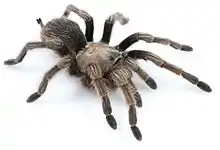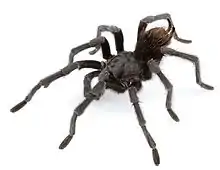| Aphonopelma johnnycashi | |
|---|---|
 | |
| Female | |
 | |
| Male | |
| Scientific classification | |
| Domain: | Eukaryota |
| Kingdom: | Animalia |
| Phylum: | Arthropoda |
| Subphylum: | Chelicerata |
| Class: | Arachnida |
| Order: | Araneae |
| Infraorder: | Mygalomorphae |
| Family: | Theraphosidae |
| Genus: | Aphonopelma |
| Species: | A. johnnycashi |
| Binomial name | |
| Aphonopelma johnnycashi Hamilton, 2016[1] | |
Aphonopelma johnnycashi is a species of tarantula (family Theraphosidae).[2] It was found in 2015 near Folsom Prison in California and named after Johnny Cash, whose song "Folsom Prison Blues" made the prison famous. Mature males are generally black, and the country music singer was also known as "The Man in Black".[1]
Natural history
This spider can be up to 6 inches (15 cm) long, the male of the species is black and the female is a dark brown. Like most North American tarantulas, they are relatively harmless to humans, unlikely to bite and with venom only mildly irritating.[3]
The new categorization of this spider is part of an effort to more carefully catalog American tarantula species. For decades there has been a suspicion that there are more species than identified, but that they are similar enough to be overlooked. The new effort has broken them down according to behavior and observable traits, though there has not been genetic testing done to truly ascertain where the species lines are drawn.[4]
References
- 1 2 Hamilton, C.A.; Hendrixson, B.E. & Bond, J.E. (2016), "Taxonomic revision of the tarantula genus Aphonopelma Pocock, 1901 (Araneae, Mygalomorphae, Theraphosidae) within the United States", ZooKeys (560): 1–340, doi:10.3897/zookeys.560.6264, PMC 4768370, PMID 27006611
- ↑ World Spider Catalog (2017). "Aphonopelma johnnycashi Hamilton, 2016". World Spider Catalog, version 18.0. Natural History Museum Bern. Retrieved 5 July 2017.
- ↑ Stuart Winter (4 February 2016). "'Johnnycashi' tarantula: Scientists name newly-discovered arachnid after country crooner". Express.co.uk.
- ↑ Michael Greshko. "New 'Johnny Cash' Tarantula Uproots Spider Family Tree". National Geographic News. Archived from the original on February 5, 2016.